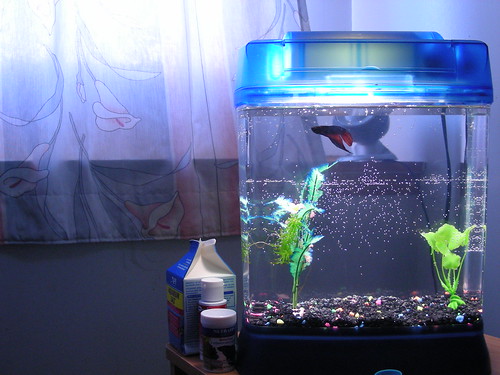Q: CD wrote,
I’d like to keep my water as stable as possible, and cycling a tank seems to be the best way to do that, from what I’m reading online. But I have a small “tank” for my fish, and no real place for anything bigger (we live in a small condo). Someone at one of the big-name pet stores says she has gotten the nitrogen cycle going in her (many) betta bowls – 1/2 gallon size!! Is this possible to do safely? She claims she’s had her fish (plural) for 2+ years and that she only does water changes (not full) once a month because of the nitrogen cycle. I thought a filter was necessary to establish this, but she says not.I’m tempted to experiment with this (in another tank, of course), but was wondering what others with more knowledge and experience on this subject might think first. If I could get a nitrogen cycle going, that seems like it would be great for both my fish and my plant.
Any thoughts?
A:Cycling a tank for your betta is a great idea. It creates a more stable and safer environment for your fish and is also a pretty cool science experiment. You’ll learn a lot just by cycling your tank.
Technically you can cycle any size body of water from as large as an ocean to as small as teaspoon. Though it might seem counter-intuitive, larger bodies of water are easier to maintain. When we all start out with fish we say; “I want something small that won’t be a lot of work.” The irony is that small tanks are more work requiring more frequent water changes and monitoring. Don’t let this deter you from cycling your small aquarium though. A fully cycled small aquarium is still easier to maintain than one that has not gone through the nitrogen cycle.
Less maintenance doesn’t mean no maintenance. You will still need to perform water changes, though the consequences of missing one become less severe and you will still need to test your tank’s water, though much less often. How often you will need to do water changes depends on how fast nitrates rise in your tank. Nitrates are the byproduct of a cycled tank. Much like ammonia, nitrate will rise based on many factors but it is not nearly as dangerous as super-toxic ammonia to your fish. Some factors that affect the rise in nitrates are:
The volume of water you have
The number of fish you are keeping
The species of fish you are keeping
Your filtration
The type of food you are feeding
The quantity of food you are feeding
Decaying organic matter in your tank
Admittedly I am a little skeptical about what the fish store lady told you. I imagine that the nitrates were pretty high in that tank and it probably took quite awhile to cycle without a filter. I’ll give her the benefit of the doubt though.
Ideally, you should have a filter running. It will not only help to remove debris from your tank but it will become, literally, a breeding ground for beneficial nitrifying bacteria. The bacteria will cling to all surfaces of your tank, including the substrate and plants, but it will be concentrated in your filter media. Having a filter will also aerate the water and will help speed up the cycling process.
The nitrogen cycle is a completely natural process and will occur in your tank even if you do nothing at all. In the old days of aquarium keeping, many fish keepers set up a tank with some cheap fish and let the entire process take place, which would often leave the cycling fish sick or dead. I personally, don’t advocate that and would rather use the fishless cycling method, or even better, would recommend seeding a tank with filter media from an already established tank. This is the fastest and easiest method for tank cycling.


nice tank! Is that a 2.5 gallon?
The biggest problem with people getting a fish tank and in the hobby is not cycling the tank. If people don’t do this your fish will die. As mentioned above it takes time for a tank to fully set up. This is one post that people should live by.
Cycling your aquarium will cause less headaches.
Wow!!!!
Very Nice Fish Tanks
Awesome job !!! well done keep it up.
This is very helpful, my betta has no filter 🙁 I feel very guilty but I didt know any thing about fish care. Iv done my homework & Flash will soon have a new home & maybe some tankmates 🙂
Its really nice fish tanks..